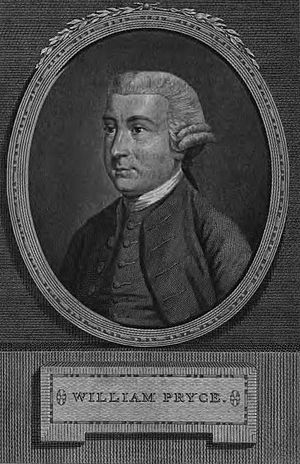William Pryce facts for kids
William Pryce (baptized in 1735 and passed away in 1790) was a British doctor. He was well-known for studying old things (an antiquary), for helping to keep the Cornish language alive, and for writing about mining in Cornwall.
Contents
Early Life and Career
William Pryce was born in Redruth, a town in Cornwall. His father was Dr. Samuel Pryce. William became an orphan when he was young, and Philip Webber from Falmouth became his guardian.
William Pryce studied anatomy, which is the study of the body's structure. Around 1750, he started working as a surgeon and apothecary (a type of pharmacist) in Redruth.
Involvement in Mining
Pryce also had an interest in mining. He owned a small part of the Dolcoath copper mine in Cornwall. For ten years, he also invested in another nearby mine called Pednandrea. This mine produced both tin and copper. It was located close to where the Redruth railway station would later be built.
In 1778, William Pryce earned his medical degree (M.D.). Later, on June 26, 1783, he was chosen to be a Fellow of the Society of Antiquaries of London. This was a special group for people who studied history and old objects. William Pryce was buried in Redruth on December 20, 1790.
Important Writings
William Pryce wrote two important books that helped people learn about Cornwall.
Mineralogia Cornubiensis
In 1778, Pryce published his main work, called Mineralogia Cornubiensis. This book was a detailed look at the mining industry in Cornwall. It covered both the history of mining and how it was done in his time.
Archæologia Cornu-Britannica
His second book, Archæologia Cornu-Britannica, came out in 1790. This book was very important for the Cornish language. It included a vocabulary list of 64 pages and a grammar guide for the language. Much of the information in this book came from the collections of other scholars, Thomas Tonkin and William Gwavas.
Family Life
William Pryce married a woman named Miss Mitchell from Redruth. They had two sons, William Pryce and Samuel Vincent Pryce. Both of his sons followed in their father's footsteps and became surgeons in Redruth.
 | Misty Copeland |
 | Raven Wilkinson |
 | Debra Austin |
 | Aesha Ash |


